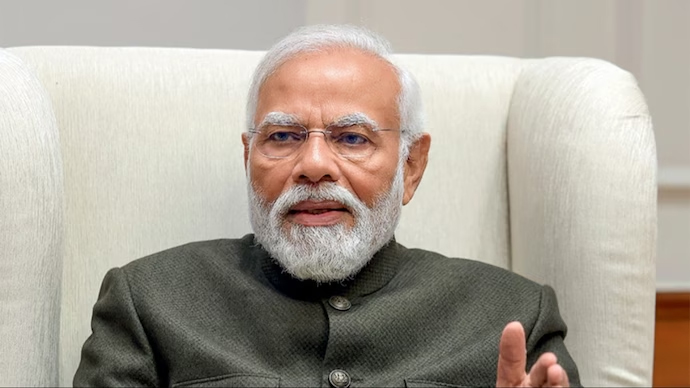PM said that the positive results of promoting chemical-free natural farming on a large scale can be seen in the country
 KRC TIMES National Bureau
KRC TIMES National Bureau

New Delhi : Prime Minister Narendra Modi on Saturday said that agriculture is at the centre of India’s economic policies, adding that small farmers are the biggest strength of India’s food security.
“Agriculture is at the centre of India’s economic policies. 90 per cent of small farmers of India who own little land make for the biggest strength of India’s food security,” PM Modi said, speaking at the inauguration ceremony of the 32nd International Association of Agricultural Economists at the National Agricultural Science Centre (NASC) Complex in Delhi.
He pointed out that a similar situation is prevalent in several developing countries in Asia, making India’s model applicable. Giving the example of natural farming, the Prime Minister said that the positive results of promoting chemical-free natural farming on a large scale can be seen in the country.
He also mentioned a big focus on sustainable and climate-resilient farming in this year’s budget, as well as developing a complete ecosystem to support India’s farmers.
Highlighting the government’s emphasis on research and development related to climate-resilient crops, the Prime Minister informed that nearly nineteen hundred new climate-resilient varieties have been handed to farmers in the last 10 years. He gave examples of rice varieties in India that require 25 per cent less water than traditional varieties and the emergence of black rice as a superfood.
“Black rice from Manipur, Assam and Meghalaya is the preferred choice due to its medicinal value,” he said, adding that India is equally eager to share its related experiences with the world community.
The Prime Minister also acknowledged the seriousness of the nutrition challenge, along with water scarcity and climate change. He presented Shri Anna, Millet as a solution given the superfood’s quality of ‘minimum water and maximum production’.
PM Modi expressed India’s willingness to share India’s millet basket with the world and mentioned the last year being celebrated as the International Year of Millets.
Mentioning the initiatives to link agriculture with modern technology, the Prime Minister talked about the Soil Health Card, solar farming, leading to farmers turning into energy providers, the digital agriculture market, i.e. e-Nam, Kisan Credit Card and the PM Fasal Bima Yojana.
He also touched upon the formalisation of agriculture and the allied sectors, ranging from traditional farmers to agri startups, from natural farming to farm stays and farm-to-table. He informed that in the last 10 years, ninety lakh hectares have been brought under micro-irrigation. As India is fast moving towards the goal of 20 per cent blending of ethanol, he said, both agriculture and the environment are benefiting.
Throwing light on leveraging digital technology in the agriculture sector in India, the Prime Minister mentioned PM Kisan Samman Nidhi where money is transferred to the bank accounts of 10 crore farmers with a single click, and a digital public infrastructure for digital crop survey that provides real-time information to farmers and enables them to take data-driven decisions.
He emphasised that crores of farmers will benefit from this initiative and improve their economic condition.
He also touched upon a huge campaign for the digitisation of land where farmers will be given a digital identification number for their land, and the promotion of drones in farming where ‘drone didis’ are trained to operate drones.
PM Modi reiterated India’s commitment to global welfare as a ‘Vishwa Bandhu’. He recalled India’s vision for global welfare and mentioned various mantras put forward by India on various fora including ‘One Earth, One Family and One Future’, ‘Mission LiFE’, and ‘One Earth One Health’.

PM Modi underlined India’s approach of not viewing the health of humans, plants and animals in silos. “Challenges before sustainable agriculture and food systems can only be tackled under the holistic approach of ‘One Earth, One Family and One Future’,” the PM said.
He further added that these steps will not only benefit the farmers of India but also strengthen global food security. The Prime Minister noted the presence of a large number of young people and expressed confidence that the next five days will witness ways to connect the world with sustainable agri-food systems. “We will learn from each other and also teach each other,” he concluded.
The triennial conference, organised by the International Association of Agricultural Economists, will be held from August 2 to 7, 2024. The theme for this year’s conference is, “Transformation Towards Sustainable Agri-Food Systems.



